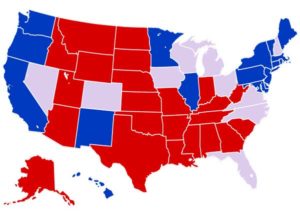2010 Tax Relief Act creates a 100% writeoff for heavy SUVs used entirely for business: HISTORY REPEATS ITSELF
[vc_row][vc_column][vc_column_text]OLD RULE:
A calendar year taxpayer bought a $50,000 heavy SUV in June of 2010 and used it 100% for business in 2010. It may write off $40,000 of the cost of the vehicle on its 2010 return, as follows:
… $25,000 expensing deduction (Sec. 179(b)(6) Limit, see below under “History”), plus
… $12,500 of bonus first year depreciation ($50,000 − $25,000 of expensing × .50 = $12,500), plus
… $2,500 of regular first-year depreciation ($50,000 − $25,000 of expensing − $12,500 bonus depreciation × .20 = $2,500.
NEW Rule:
Now 100% first-year writeoffs for heavy SUVs. Under the 2010 Tax Relief Act, the bonus first-year depreciation percentage is 100% (instead of 50%) for bonus-depreciation-eligible “qualified property” that is generally (1) placed in service after Sept. 8, 2010 and before Jan. 1, 2012, and (2) acquired by the taxpayer after Sept. 8, 2010 and before Jan. 1, 2012. Qualified property includes property to which MACRS applies with a recovery period of 20 years or less. Autos and trucks are 5-year MACRS property and thus qualify for bonus depreciation (assuming business use exceeds 50% of total use). (Code Sec. 168(k)(2)(D))
Thus, a taxpayer that buys and places in service a new heavy SUV after Sept. 8, 2010 and before Jan. 1, 2012, and uses it 100% for business, may write off its entire cost in the placed-in-service year. There is no specific rule barring this result for heavy SUVs. Thus, if the taxpayer in our illustration above had bought the heavy SUV in, say, October of 2010, it could write off the full $50,000 cost of the vehicle on its 2010 return.
History Repeats Itself
The old George Bush Loophole that, for about 2 years, allowed people to write-off 100% of the cost of their Hummer used for business…that was ended 10/22/2004:
Heavy SUVs—those with a GVW rating of more than 6,000 pounds—are exempt from the luxury auto dollar caps because they fall outside of the definition of a passenger auto in Code Sec. 280F(d)(5).. To deal with this “SUV tax loophole,” the American Jobs Creation Act of 2004 (Public Law 108-357) imposed a limit on the expensing of heavy SUVs. Under Code Sec. 179(b)(6), not more than $25,000 of the cost of a heavy SUV placed in service after Oct. 22, 2004 may be expensed under Code Sec. 179. These rules apply, with some exceptions, to SUVs rated at 14,000 pounds GVW or less.
If you use your SUV less than 100%, all these rules apply based on the percentage of business use for the SUV. So, if based on mileage during the year, you use an SUV 80% for business and 20% for personal use, you would apply these rules to the 80% business use portion of the costs of the SUV. Below 50% business use, no Sec. 179 deduction is allowed.
Political comment: On this issue, Presidents Obama and Bush came to the same conclusion, which upset many people who can’t afford heavy SUVs and write them off in the 1st year as a tax deduction.
Feel free to call or write us if you need assistance with this issue.[/vc_column_text][/vc_column][/vc_row]
Could “Red” States Actually Be Considering Tax Hikes?
Revamping the nation’s tax system is a very hot topic in Washington D.C. at the moment and that’s not going to change any time soon. One of the reasons Donald Trump was elected president was his stance on simplifying the country’s tax system and lowering the nation’s tax bill. This was a common theme…
Did I Accomplish All I Wanted?
Did I Accomplish All I Wanted? When you think about life, what do we have that comes of lasting value? Eventually, we go to the grave and the things that we acquire don’t go with us, but the memories that we leave behind and relationships with others will be long lasting. I recently had an interesting experience…
Important Tax Filing Deadlines You Don’t Want to Miss
Before you send in your tax return there are a lot of things you have to remember, which is why having a tax checklist is good idea. Of course, the right accountant will help you with that as well. However, before you ever get to that final point in the tax-filing process, you need to…
Which Tax Policy Issues Will Be Big in 2017?
Taxes, taxes, taxes. One could argue that 2017 will bring more changes to our country’s tax system and policies than we’ve ever seen before. The hope is that all that change will bring about better rewards, including a simplified tax return process and tax cuts for most, if not everyone. So as the New…




